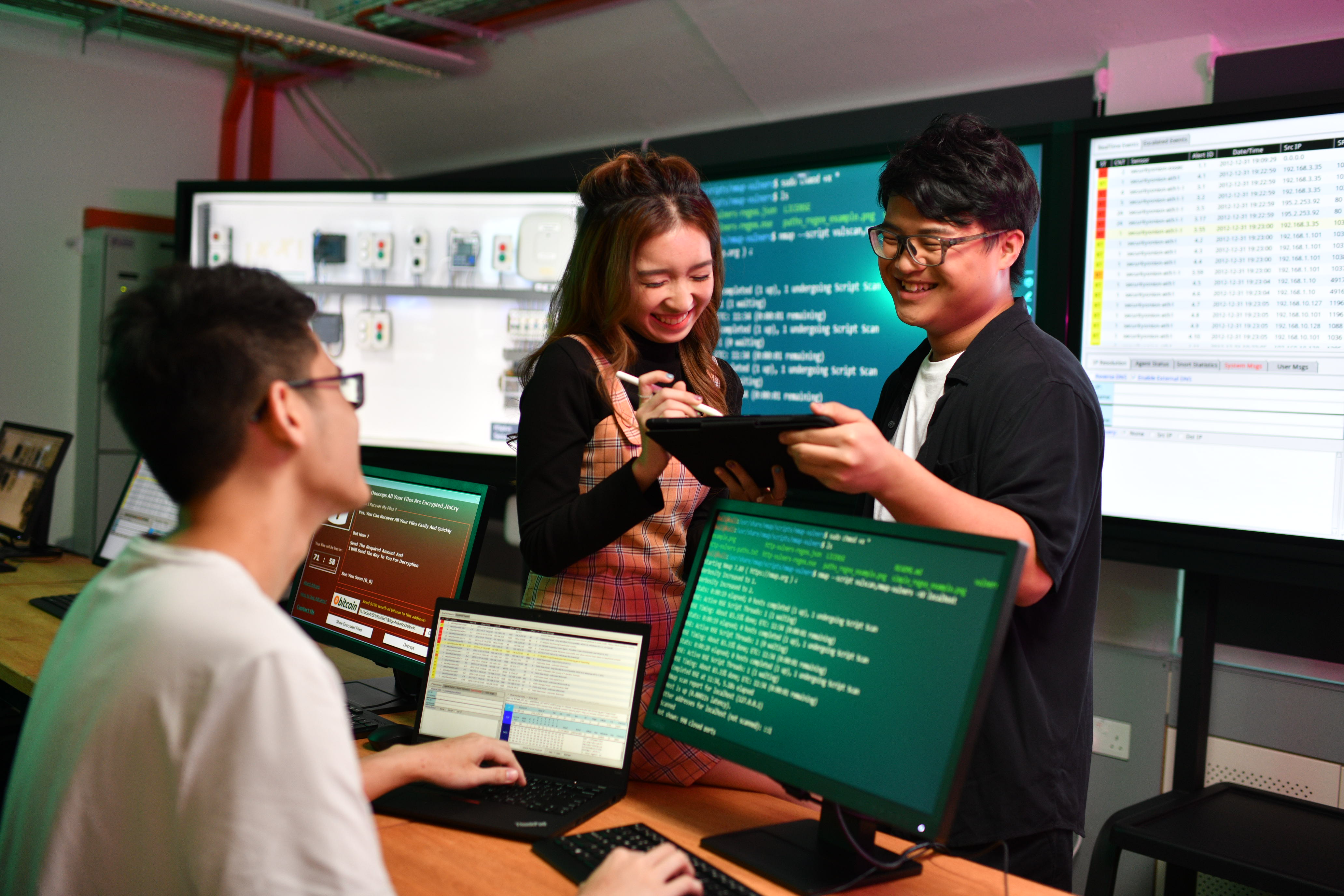
Are you curious about how computers work, and do you enjoy working with technology? If you’re analytical, detail-oriented, and curious about computer systems, the Diploma in Computer Engineering is for you. Tailored for those who prefer practical, experiential learning. You’ll engage in hands-on activities in advanced labs, working with real hardware and software. Start your journey in computer engineering at SP today.
In addition, you will graduate with a Minor upon the completion of a suite of related elective modules. SP offers 6 Minors for you to choose from:
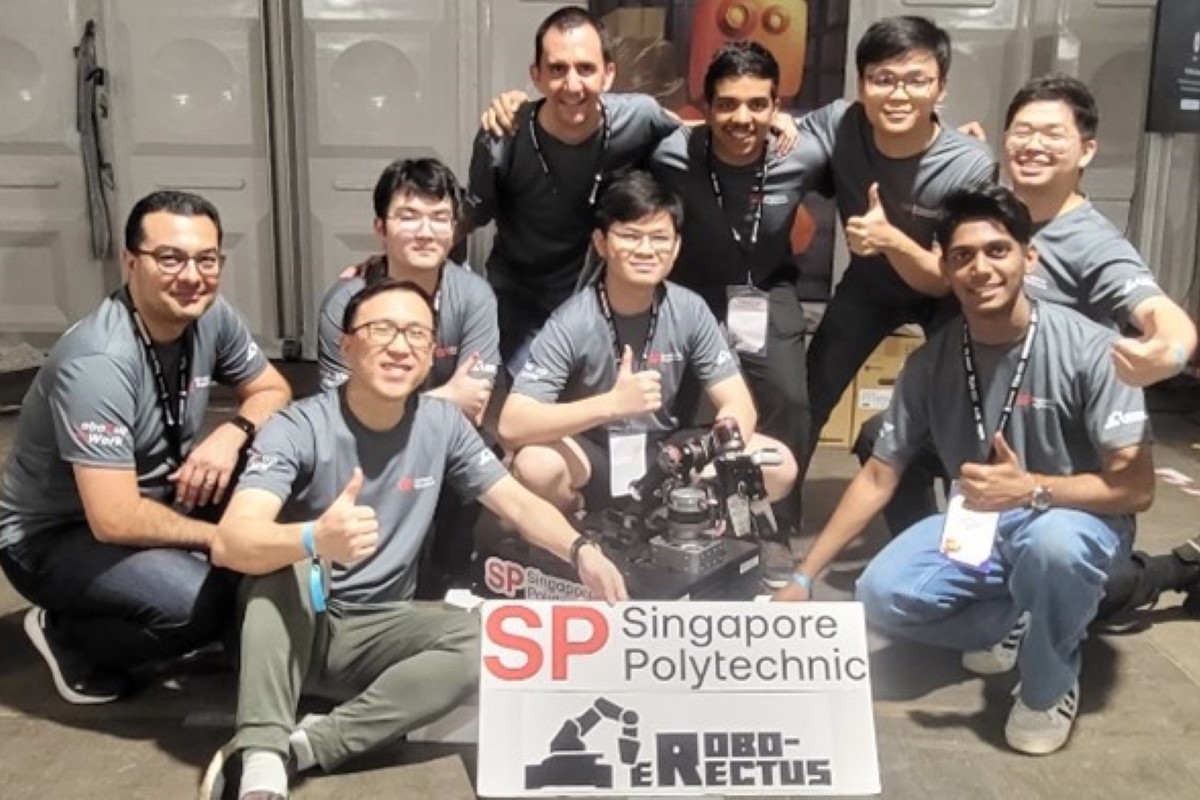
This diploma enhances your logical thinking and empowers you with knowledge and practical skills, helping you thrive in the dynamic field of technology. You'll engage in large-scale projects and work with like-minded professionals, laying a solid foundation for a future in cybersecurity, AI and automation. With the right skills and mindset, you'll excel in computer engineering and reach your career goals.
Computer engineering in 2025 is about designing and implementing the technology that powers our daily lives. It focuses on hardware-software integration, preparing you to work on smarter AI systems, faster 5G connections, and secure technologies. This unique mix makes computer engineers vital for driving innovation and industry growth.
Computer engineering plays a big role in our daily lives. Without it, services like healthcare and communication would be slower and less efficient. It helps you learn skills to create useful solutions, work with like-minded peers, and create new solutions that improve lives.
Please note: Course structure is subject to change.
DCPE students make a choice between Computer Engineering & Software (CES) or Computer Networking & Security (CNS) path in Year 2 of the Course. These two equally exciting paths have been designed to suit the interest, strength and career aspiration of the students. In Year 3 of the course, you can specialise in one of four fields: Computer Science [NEW], IoT & Intelligent Systems [NEW], Cloud Systems, or Cyber Security.
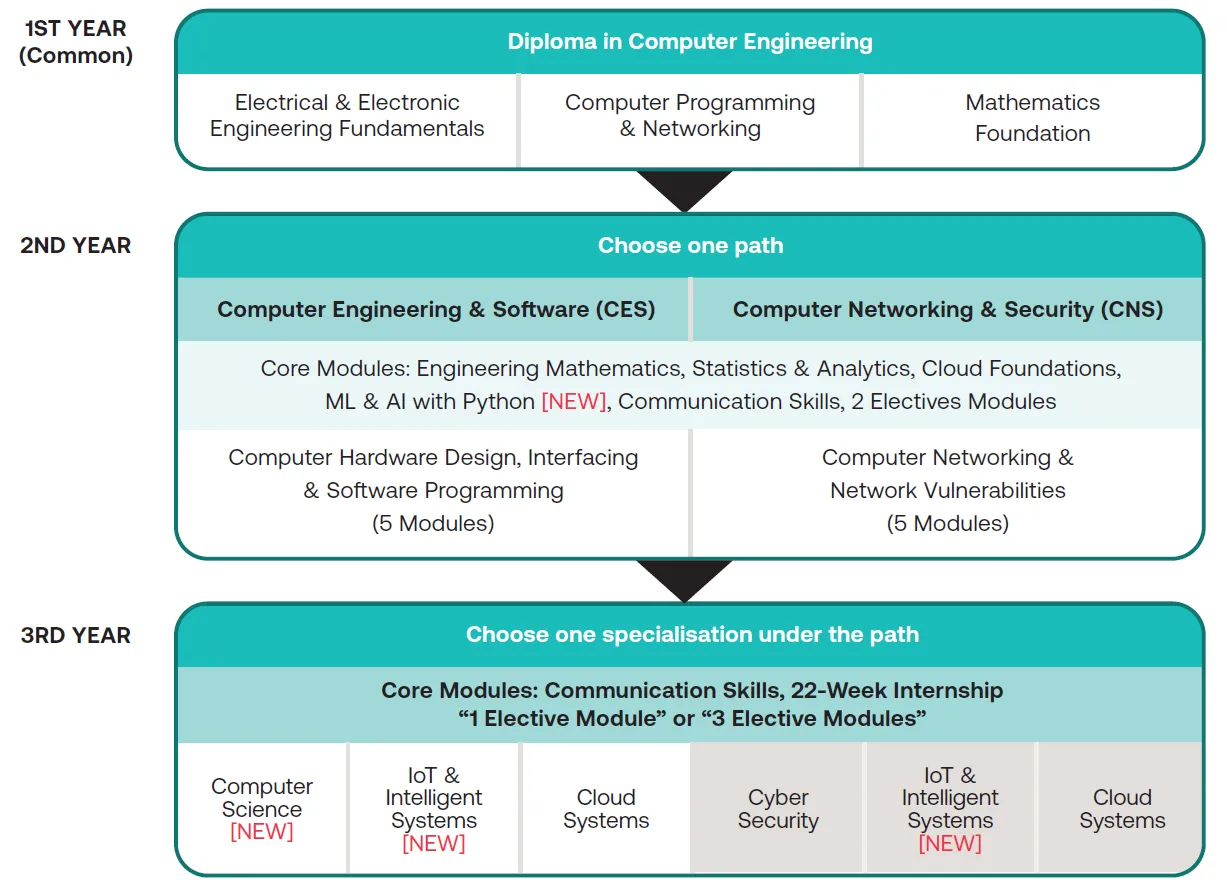
Building Foundations in Computer Engineering and Essential Skills
In Year 1, you will start with the basics of computer engineering. You’ll learn key concepts, common practices, and important terminologies through modules like Principles of Electrical and Electronic Engineering, Digital Electronics, Network Fundamentals, Basic and Engineering Mathematics. These modules will introduce you to essential software and hardware skills.
Electives The SP elective framework offers students options to pursue their passion and/or meet different career needs, and is an integral part of the holistic education we seek to provide to our students.
Learn about SP Elective Framework
The Common Core Curriculum (CCC) prepares you for a changing world with essential human and digital skills. Through its 10 modules, the CCC also provides a wide learning experience to examine local and global issues based on the Sustainable Development Goals (SDGs). These modules help you understand real-world issues and the impact on different communities, and equip you with skills to create a better, sustainable Singapore and world.
This module provides a general overview of computer networking. It provides a general introduction to networking terminology, concepts, devices, functionality, applications and standards required for computer networking. Students will learn to build simple LANs, perform basic network and service configurations, and implement IP addressing schemes.
Introduces students to the knowledge, understanding and design techniques necessary to enable them to design simple combinational circuits using commercial SSI and MSI integrated circuits. Additional topics covered include introduction to simple sequential logic circuits such as flipflops and mono-stables
Builds on basic material covered earlier with advanced topics such as adders, multiplexers/ demultiplexers, decoders/ encoders, counters and shift registers and some application examples of these circuits.
Equips students with the knowledge of drawing office practice, ISO drawing standards and drawing skills using latest AutoCAD software and the ability to read and produce good technical sketches and projection drawings as a form of engineering communication. The module will cover basic 2D drawings, isometrics and orthogonal projections, 3D-Design using Autodesk software for 3D-Printing & Laser cutting assignments, and the use of workstation based CAD/CAM software for computer-aided drafting.
This module equips students with engineering fundamentals set in the context of CDIO (conceive, design, implement and operate) in real-world systems with basic electronic projects. It aims to nurture students toward self-directed learners by giving them a challenging environment to plan, manage, review and extend their learning outcomes using growth mind-set and meta-cognitive learning systems in achieving their electronic projects. Besides, students will be exposed to a range of generic process skills such as troubleshooting skills, creative and critical thinking, teamwork and communication.
This module teaches students to write programs in a structured way. It emphasises on good programming techniques and covers topics on fundamental data types, input / output, selection control and loop constructs, functions and basic structures such as arrays. At the end of the module, the students will be able to write programme for simple engineering application that runs on computer and simple engineering application that runs on basic embedded system and control it.
This module covers the fundamental concepts of electricity. Understanding and application of electrical phenomena are further enhanced using circuit simulation on worked examples and tutorial problems and via hands-on sessions. Topics covered include scientific notation, engineering notation, metric prefixes, basic elements of an electrical circuit, definitions of energy and power, power sources, measuring instruments, DC and AC concepts, simple series and parallel networks, electromagnetism, inductor, inductance, transformers, capacitor and capacitance, characteristics of inductor and capacitor in DC, Kirchhoff’s Voltage and Current Laws, Current and Voltage Divider Rules and Superposition Theorem.
Extends the basic concepts onto other electrical and electronic devices. Topics covered include: Semiconductor physics, semiconductor devices such as diodes, special diodes and bipolar transistors, transducers such as thermistors, and application of operational amplifiers, complex numbers and concepts of phasors, phasor angle, phasor diagrams, reactances, impedances, susceptances and admittances. Upon completion, this module consolidates students’ foundation of the electrical and electronic engineering.
This module equips students with basic mathematical skills and knowledge in Algebra and Trigonometry to enable them to understand and solve engineering problems encountered in the course of studies. It also serves as a foundation for subsequent mathematics modules.
This module equips students with the necessary mathematical knowledge and skills to solve problems encountered in their course of study. Among the topics covered are Determinants and Matrices, Complex Numbers and Calculus.
Find out what goes into a healthy and productive team where ideas, insights, and responsibilities are shared meaningfully. Sharpen your interpersonal and communication skills to collaborate effectively in a digital environment.
Leverage digital communication to engage, inspire and impact stakeholders diligently. Learn about responsible Digital Citizenship and how you can create engaging and impactful messages through various digital platforms and tools.
Acquire the skills needed to write in clear and concise English to effectively communicate an intended message to your target audience. Apply these skills when writing for specific contexts, such as scenarios related to the SDGs.
Develop data fluency skills such as formulating questions, processing and analysing data to articulate numerical and graphical summaries. Build a simple data dashboard to generate insights and support a solution for a chosen SDG.
Develop data visualisation skills and apply narrative elements and persuasive delivery techniques to communicate data effectively. Learn to craft compelling narratives, based on hard facts and data, to call stakeholders into taking action to tackle the SDGs.
Develop critical and analytical thinking skills, along with the ability to present your point of view with credible and relevant evidence. Enhance your knowledge and appreciation of local and global issues covered in the 17 SDGs, with a focus on the former.
This module aims to help students discover their strengths, values and interests. It also supports students in making informed educational and career choices to achieve their career aspirations.
Appreciate the use of both creative and computational thinking skills to solve a SDG-related problem. Apply focused and diffuse thinking , brainstorming techniques, and the four pillars of computational thinking to a chosen SDG.
Choose between Engineering and Software or Networking and Security
In Year 2, you can make a choice between
You’ll also participate in a Sustainable Innovation Project (SIP), which encourages creative problem-solving and innovative thinking. This year focuses on deepening your knowledge and preparing you for internships and the professional world.
This is an introductory module to Cloud Computing. It introduces students to the fundamental knowledge and overall understanding of cloud computing concepts. Using contents from Amazon Web Services (AWS)’s “Cloud Practitioner” course, this module provides a detailed overview of cloud computing concepts, core services, security, architecture, pricing, and support. Students will apply their cloud computing knowledge in practice with elements of hands-on in lab practical work and projects. This training will prepares students to progress towards practical experience with cloud computing, and the industry recognised “AWS Certified Cloud Practitioner” exam, which represents the first milestone to achieve while working through the AWS Academy Cloud Computing Architecture courses.
This module begins with an introduction to Python programming, equipping students with the foundational skills necessary to write and understand Python code. It then introduces the concepts and various algorithms of Machine Learning and edge AI computing. This will enable students to apply AI and Machine Learning in real-world application projects. Additionally, the module covers the design and data studies needed to drive organisational decisions and insights using statistical and computational techniques and tools, algorithms, predictive data modelling, and data visualisation.
The module is designed to provide students with further knowledge in mathematics and analytical skills to solve engineering problems encountered in their studies. Among the topics covered are Calculus, Ordinary Differential Equations, Laplace Transforms and Fourier Series.
This module aims to provide students with an introduction to statistics and data analytics. The topics in statistics include descriptive statistics, probability, random variables, probability distributions, sampling distributions, and estimation. The topics in data analytics include a brief overview of data mining, cluster analysis, decision tree classifier, and simple and multiple linear regression. Software tools will be used throughout for hands-on exercises.
Please refer to Elective Modules Framework for more information.
Please refer to Elective Modules Framework for more information.
Work in multi-disciplinary groups to apply design thinking methods, backed by research and qualitative data, to tackle local sustainable issues mapped to the SDGs. Tap into knowledge and skills learnt in CCC modules to create innovative prototypes for real-life issues faced by local communities.
Learn the broad overview of Artificial Intelligence (AI) and its societal and ethical impact on modern society. Build a simple AI model with a drag-and-drop tool and consider how the use of AI can address a chosen SDG.
Provides students with the skills and knowledge to develop and implement games or applications that can run on mobile phones. Students will be introduced to open-source software tools available for programme development, key concepts in mobile programming, user-interface classes, sensors and local data storage. By the end of the module, students should be able to conceptualise and complete a mobile game or application.
This module provides an introduction to DevOps (Development Operations) and its role in the Software Development process today in the development of AIoT (Artificial Intelligence + Internet of Things) applications. The basic Software Development process is explained to the students and the role and as a basis to of explaining how DevOps has become an essential component the modern Software Development process. Students will have hands-on experience using DevOps tools such as Git / Github, Jenkins, Docker, Kubernetes, etc. To consolidate the student’s grasp of DevOps and its importance in the Software Development lifecycle, students will implement an AIoT application supported by a full DevOps infrastructure.
This module aims to teach student fundamental knowledge, skills and tools necessary to become proficient in developing end-to-end web applications. Through this course, students will gain practical experience in both front-end and back-end development, enabling them to design, implement, and deploy fully functional web applications.
Introduces the use of microcontrollers in a range of system applications. Students are taught how a microcontroller works, how to program it, and the use of microcontroller. In addition, students will learn basic analogue and digital support circuitry, sensors and actuators/displays required for a microcontroller based application. This module allows students to develop a project conceived around a microcontroller system with sensors and output devices.
Provides an understanding of network fundamental and computer network routing principles. Students will learn the difference between routing and routed protocols and to configure routers for LAN communications. Students will also be equipped with network troubleshooting skills and able to discuss LAN design issues involving multiple routers at the completion of the module.
Introduces students to the principles, concepts and techniques in managing servers. Upon successful completion of this module, students should be able to understand how to install servers, manage users over a network, how to avoid problems through fault tolerance, and how to recover from problems through disaster recovery and how to troubleshoot network/server problems. Students should be able to evaluate and select the appropriate tools to manage the network with emphasis on server management and administration.
Provides students a complete foundation in Wireless Networking and LAN Switching. Wireless Networking covers basic RF theory, hardware installation, configuration and management, troubleshooting, security, and site surveying. LAN Switching covers basic switch concepts and configuration, virtual LANs, VLAN protocols and Inter-VLAN Routing.
This module aims to provide students with the fundamental concepts for securing hosts and network systems. Students will learn the basics of information security. Students will be able to identify threats and vulnerabilities of computer and network systems. The module will also provide some basic understanding of IDS/IPS, firewalls, and honeypots. Students will learn about network scanning concept, tools, techniques, as well as some basic techniques that hackers use to penetrate network systems, and the way to fortify their own system against those techniques. They will be able to conduct penetration testing and recommend appropriate cyber / information security risk management practices to combat such vulnerabilities and threats.
In Year 3, you’ll apply your knowledge through an internship, gaining hands-on experience in the industry while also completing the common modules.
The Internship Programme aims to provide students with an authentic on-the-job work experience in an engineering, or technology-enabled business field, to prepare them to be truly work-ready. Students will also be able to establish an industry network and learn from the experience of working professionals. Students will undergo a structured learning programme, including attending safety induction and participating in the industry projects as part of their internship. The intent of the programme is to enable students to apply and enhance their range of technical skills, hone their knowledge in areas such as professional ethics, role and responsibility of engineers, and understand the business environment in which companies are situated – as advocated by the CDIO syllabus. By the end of the programme, students will have a greater insight into what industry expects of employees, as well as opportunities to develop technical workplace competencies and other important professional skills.
Get a head start in your career with the necessary skill sets, knowledge and tools to create your very own personal brand. Learn effective strategies to set yourself apart from the competition, and put it to good use and create awareness about the SDGs.
Please refer to Elective Modules Framework for more information.
You can specialise in one of four areas:
By the end of Year 3, you’ll be a confident graduate ready to enter the industry.
This module demonstrates structural organization and hardware design of digital computers. Various fundamental mechanisms such as register transfers, micro-operations, control units and timing, instruction set design, and input/output devices will be explained. It will also introduce the principles and practices of high-performance computing (HPC), including the use of Graphics Processing Units (GPUs).
This module provides a theoretic understanding and hand-on in data structures and algorithms commonly encountered in computer programming. Student will receive further understanding in data types, construction and operations of more complex data types and structures beyond their previous programming modules. Principles and reasoning of algorithms and methods commonly encountered will be covered. Constructions and associated operations of linked lists, stacks, queues, and binary trees will be included. Applications associated with common data structures and algorithms will be introduced.
This module provides a comprehensive understanding of deep learning. Students will learn the core concepts of neural networks, including how to design, implement, and train them using Python and TensorFlow. Key topics include the basics of convolutional networks, sequence models, and essential techniques for model optimisation. The module emphasises practical applications, enabling students to apply deep learning techniques to solve real-world problems.
This module introduces quantum computing, starting with the basics of quantum theory and how it differs from classical computing. Students will learn the concept of qubits, their interactions, and the mechanics of quantum computing. Students will learn various technologies and setups for quantum computers, programming languages relevant to quantum computing, and recap necessary mathematical concepts. It also introduces applications of quantum computing in fields like machine learning, simulation, AI, and cryptography.
This module provides an in-depth exploration of edge computing, a transformative technology that processes data closer to the source, reducing latency and bandwidth usage. Students will explore the architecture, technologies, and applications of edge computing, including its integration with IoT and cloud computing. The course also addresses the critical aspects of security and privacy in edge computing environments. The module is designed to equip students with the knowledge and skills needed to design, implement, and manage edge computing solutions across various industries.
To provide students with knowledge and understanding of low cost and small size but powerful embedded computer systems, used commonly for industrial and home devices. The practical use of such systems is shown by how the Internet is used to control common devices.
This module provides students with the skills to understand and design smart infrastructures, focusing on essential technologies for building sustainable smart cities. Key topics include smart city applications, networking basics, M2M communication, sensor networks, IoT security, data analytics, video analytics systems, and smart city application design. Through these topics, students will learn to create and manage efficient, secure, and innovative smart systems that promote sustainability.
The aim of this module is to introduce the students to the basic knowledge of 5G Technology, and the potential of 5G technology in enabling the development of new business models and advanced applications. Students will learn about the key domains of 5G technology: wide bandwidth, low latency, and massive IoT, and the use cases that tap on these characteristics of 5G connections. This module will also briefly cover other wireless technologies, for comparison with 5G and also as alternative connection solutions. This module will discuss some use cases where the combination of 5G, Artificial Intelligence (AI), and Internet of Things (IoT) technologies can bring to the creation and implementation of some emerging engineering applications.
Introduces the student to the inner workings of Operating Systems for computers. It provides a clear description of the concepts that underlie operation systems. At the end of this module, students will have a good understanding of the OS's management system such as processes, memory, storage, I/O devices and security issues.
This is an introductory module to the modern software development methodologies and tools, focusing more on IT and Network operations. Using contents from Cisco Networking Academy’s “DevNet Associate” course, this module teaches students Python programming for scripting, use of GIT, common data formats (JSON, XML and YAML), use of containers for application deployment, CI/CD pipelines, and infrastructure automation. Through this module, students will gain practical and hands-on experiences. They will be equipped with entry-level software development and infrastructure automation skills, and well-prepared for the DevNet Associate certification exam.
This is an introductory module to architecting cloud-based IT solutions using public cloud services. Using contents from the “AWS Academy Cloud Architecting” course, this module covers the fundamentals of building IT infrastructure on AWS. Students will learn to optimize the use of the AWS Cloud by understanding various AWS services and how to best-fit them in cloud-based solutions. Students will learn the best practises of architectural solutions to serve different industries, different types of applications, and different size of the business. Throughout the module, students will experience the building of a variety of infrastructures. This module helps students prepare for the “AWS Certified Solutions Architect – Associate” exam.
This module provides a comprehensive introduction to cloud-native application development. It equips students with the foundational knowledge and tools required to build modern, scalable, and resilient applications in cloud environments. Throughout the course, students will gain hands-on experience with various essential technologies, including microservices architecture, containerisation, and continuous integration and delivery (CI/CD), which are crucial for developing cloud-native applications.
Covers secure network design and the technologies for securing the perimeter of a network. Security features of perimeter devices (routers and firewalls) including various filtering techniques (e.g. packet filtering, Proxy filtering and Stateful filtering) are covered. Other topics include Virtual private network, Intrusion detection and prevention, disaster recovery and business continuity. In laboratory, students will learn to configure Cisco routers and ASA (Adaptive Security Appliance) for De-Militarised Zone, Virtual Private Network, and authorization.
Teaches the use of Network Analysis and Packet Capture tools to analyse data flowing through a network. Students will learn how to use analysis tools to perform forensic tests to determine the nature of any security breaches and exploits. The module will also use case studies to determine the nature of different exploits used by hackers on the Internet.
The aim of this module is to introduce the core security concepts and skills needed to monitor, detect, analyse and respond to cybercrime, insider threats, advanced persistent threats, regulatory requirements, and other cybersecurity issues facing organizations. It emphasizes on the practical application of the skills needed to maintain and ensure security operational readiness of secure networked systems. The module takes the contents from Cisco Certified CyberOps Associate certification course.
This module introduces students to the necessity of acquiring knowledge of Internet security and the inner workings of a hacker attacking a server over the Internet. Students will be introduced to the concept of AI and Machine Learning for Cybersecurity. In addition, students will delve into using various applications of AI tools and techniques to detect and mitigate various cyber threats and attacks.
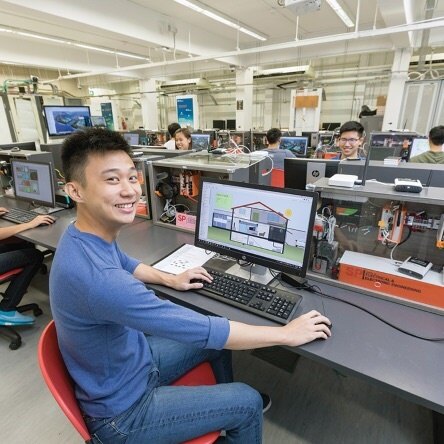
What are the eligibility requirements for computer engineering?
Applicants should not be suffering from severe vision deficiency, acute hearing impairment or uncontrolled epilepsy. Interested applicants with any of these conditions are advised to contact Singapore Polytechnic for more information.
You must meet the following criteria to qualify for the Diploma in Computer Engineering:
Applicants must obtain:
i) the following GCE 'O' Level grades at not more than two sittings and
ii) 26 points or better for the net ELR2B2 aggregate score (i.e. English Language, 2 relevant subjects and best 2 other subjects, including CCA Bonus points)
| Subject | Grade |
|---|---|
| i) English Language (as 1st Language) | D7* |
| ii) Mathematics (Elementary / Additional) | C6 |
iii) Any one of the following subjects • Biology • Biotechnology • Chemistry • Combined Science • Computing / Computer Studies • Design & Technology • Electronics / Fundamentals of Electronics • Physical Science • Physics / Engineering Science • Science (Chemistry, Biology) • Science (Physics, Biology) • Science (Physics, Chemistry) | C6 |
*Applicants offering SPM / UEC qualification must attain a minimum grade A+ to C / 1 to 6 for their Bahasa Inggeris (1119) / English Language.
SPM Grades A+ to C are equivalent to GCE 'O' Level Grades 1 to 6.
Note: IGCSE / GCSE Grades A to C is comparable to GCE 'O' levels Grades 1 to 6 and IGCSE / GCSE Grade D is comparable to GCE 'O' Grade 7.
(For those with new IGCSE / GCSE Grades 9 to 1, Grades 9 to 4 would be comparable to GCE 'O' levels Grades 1 to 6 and IGCSE / GCSE Grade 3 is comparable to GCE 'O' Grade 7).
Net ELR2B2 Aggregate Range (2025 JAE): 7 to 13 points
2025 Planned Intake: 185
The JAE ELR2B2 indicates the net aggregate score of the lowest and highest ranked students who were admitted to these courses in the JAE. These aggregate scores are meant as a reference for applicants applying to these courses, and do not constitute the admission scores for subsequent admissions exercises.| SUBJECT | GRADE |
|---|---|
| i) General Paper (English Medium) OR Knowledge & Inquiry | A - E |
| ii) H2 Mathematics | A - D |
| iii) H2 Physics | A - D |
^ - Admission to the 2.5-year diploma course is based on merit.
Higher Nitec holders must have a minimum Grade Point Average (GPA) of 2.0.
Unless otherwise stated, the course duration of a Diploma course is 3 years.
| Relevant Higher Nitec |
|---|
| Advanced Manufacturing / Engineering with Business |
| Aerospace Engineering |
| Business Information Systems |
| Cyber & Network Security / Network Security Technology |
| Electrical Engineering # |
| Electronics Engineering / Industrial Electronics Engineering # |
| Electro-Mechanical Engineering # |
| E-Business Programming |
| Facility Management |
| Information Technology |
| IT Applications Development |
| IT Systems & Networks |
| Manufacturing Engineering |
| Mechanical & Electrical Engineering Design / Mechanical & Electrical Drafting & Design |
| Mechanical Engineering |
| Mechatronics Engineering # |
| Rapid Transit Engineering |
| Robotics & Smart Systems |
| Security System Integration |
| Wireless Technology |
# Those with GPA of 3.5 or more and passed the Bridging Maths 1 (BM1) programme, or have obtained at least C6 grade in GCE ‘O’ Level Mathematics, may be admitted to the 2nd year of a 3 year course.
Nitec holders must have a minimum Grade Point Average (GPA) of 3.5.
| Relevant Nitec |
|---|
| Aerospace Avionics |
| Building Servicing / Building Services Technology /Building Services Technology (Air-Conditioning & Refrigeration) /Building Services Technology (Mechanical & Electrical Services) /Facility Technology /Facility Technology (Air-Conditioning & Refrigeration) |
| Communications Technology |
| Electrical Fitting & Installation /Electrical Installation & Servicing /Electrical Technology /Electrical Technology (Installation & Servicing) |
| Electrical Technology (Lighting & Sound) |
| Electrical Power & Machines / Electrical Technology (Power & Control) /Electrical Technology (Power & Machines) |
| Electro-Mechanical Servicing / Mechatronics /Mechatronics (Automation Technology) /Mechatronics (Equipment Assembly) /Mechatronics (Medical Technology) |
| Electronics (Display Technology) |
| Electronics & Internet of Things |
| Electronics / Electronics Servicing /Electronics (Broadband Technology & Services) /Electronics (Computer & Networking) /Electronics (Computer Technology) /Electronics (Disk Media) /Electronics (Instrumentation) /Electronics (Manufacturing) /Electronics (Mobile Devices) /Electronics (Video Technology) /Electronics (Wafer Fabrication) /Electronics (Wireless LAN) |
| Electronics, Computer Networking and Communications |
| Facility Technology (Mechanical & Electrical Services) |
| Infocomm Technology /Info-Communications Technology (Networking & System Administration) |
| Info-Communications Technology (Cloud Computing) |
| Mechatronics & Robotics |
| Microelectronics |
| Mobile Systems & Services /Info-Communications Technology (Mobile Networks & Applications) |
| Social Media & Web Development |
| Web Applications |
ADMISSIONS CRITERIA
For O-Level students:
Net ELR2B2 aggregate score of 26 points or better for the GCE O-Level exam and minimum entry requirements for the respective diploma courses.
For ITE students:
a) Final net GPA 3.5 or better for Nitec holders
b) Final net GPA 2.0 or better for Higher Nitec holders
Applicants will be notified by emails In the month of July/August
Building Portfolio - Compile all relevant certificates and evidences
Remark: STEM stands for Science Technology Engineering and Mathematics
Write-up Tips
Tips for Interview
The duration of the interview is around 30min in the form of group interview with a panel of staff.
For working adults, you must be Singapore Citizen (SC) or Permanent Resident (PR) with at least two years of relevant work experience. The examples of work experience / Job roles for the respective EEE Diplomas are as shown below.
For DCPE (Diploma in Computer Engineering), examples of work experience / job roles includes but not limited to the following:
More Information on EAE Application
All You Need to Know About EAE
This course is perfect if you’re analytical, love challenges, and think critically. Ideal for those who are detail-oriented, process-focused, and curious. Computer engineering enhances your problem-solving skills and creativity, preparing you to tackle complex tech challenges and innovate in real-world environments. If this sounds like you, computer engineering could be your path.
SP offers many scholarships to recognise talent and service, from Year 0 to after graduation. These scholarships provide tuition fee waivers and chances to represent SP. They are awarded for academic excellence, contributions to arts or sports, and community service. Edusave awards and external sponsorships are also available.
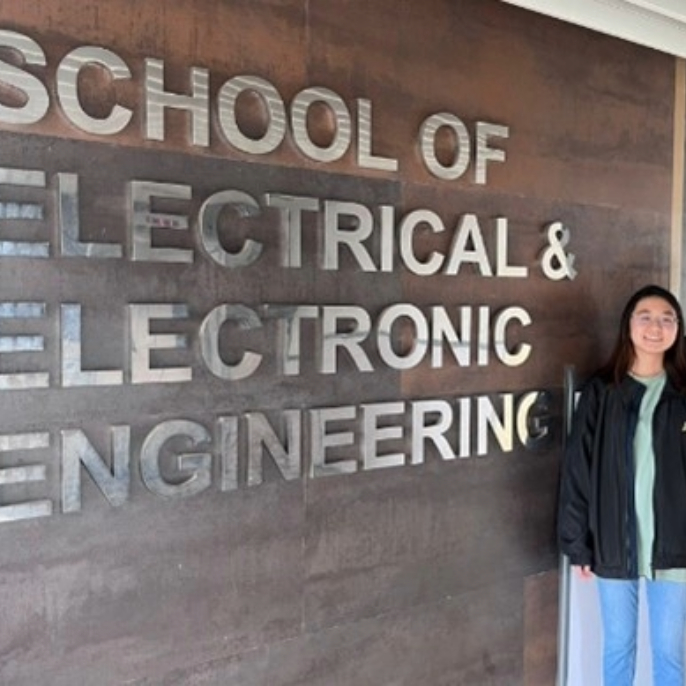
Computer engineering at SP prepares me for the future.
Excelling in computer engineering requires hands-on learning. At SP, you’ll find amazing laboratories that let you build foundational skills in Digital Electronics, Electrical and Electronics, and Digital Fabrication. The Network Security Operation Lab trains you to tackle cybersecurity threats, while the Data Analytics Lab focuses on big data and visualisation tools. Explore IoT in the SMART Connected Solutions Lab and work on real-world projects in AI, smart devices, and more at the 5G & AIoT Hub. These facilities ensure that you're fully prepared for the tech industry.
Computer engineering at SP prepares me for Singapore.
Computer engineering is important because it powers everyday technology. In 2025, advancements in AI and 5G are transforming industries. However, cyber threats are becoming increasingly pervasive. DCPE equips you with the knowledge to understand these technologies and address cyber threats, preparing you for the future. Many people think it's just about coding, but it also includes hardware and designing systems that change how we live and work.
Computer engineering at SP prepares me for the world.
In computer engineering, you can specialise in several fields. At SP, these include:
Each specialisation provides thorough training so that you’re prepared for advanced roles in the tech industry.
SP provides 22-week internships at various organisations, including startups, SMEs, MNCs, and government agencies. Students have interned at leading organisations like Equinix (Singapore) Enterprises Pte Ltd, Singapore Technologies Engineering Ltd, NCS Pte Ltd, Singapore Telecommunications Limited, and the Centre for Strategic Infocomm Technologies.
These internships allow you to make significant contributions and often lead to advanced job offers. They provide insights into different business environments and help you decide if this field suits you. Some interns move on to full-time roles like Data Centre Operation Technicians, laying a solid career foundation.
Internships connect you with industry professionals, offering job insights and opportunities. SP supports with coaching to boost your confidence and employability. Experiencing diverse internships broadens your career perspective, leading to informed decisions, higher starting salaries, and business exposure. A quality internship provides meaningful work, learning opportunities, professional growth, and guidance from mentors.
Overseas exposure helps broaden your horizons. Understanding globalisation and working with diverse cultures is important in a global city like Singapore. Computer engineering students and alumni have experienced international internships and exchanges, enriching their worldviews and career prospects. Students in other CCAs also have opportunities to represent Singapore abroad and gain international experience.

With your diploma, you can choose between further education or beginning your career.
More than two-thirds of SP graduates continue their education at local and international universities, with SP diplomas recognised by over 150 universities worldwide. Many graduates receive over a year of advanced standing. Alternatively, you can start working at companies like AWS, GovTech, Singtel, and Bosch, using the skills you learned at SP.
Both pathways offer great opportunities to grow and succeed in computer engineering.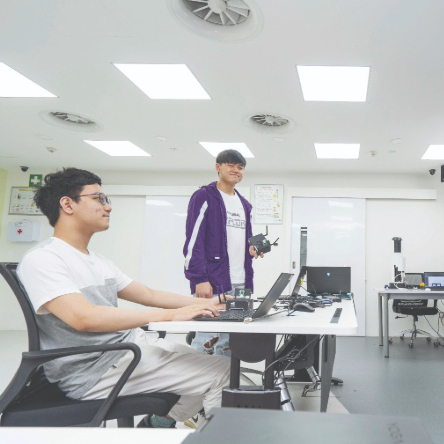
The computer engineering industry offers many career paths, depending on your specialisation. Exploring different sectors can help you decide on a full-time job.
Common roles include Junior Engineer, Systems Analyst, and Senior Engineer. With technology advancing rapidly, the demand for computer engineers is high, making it a great field to enter.
Career Options:
SP EEE diploma graduates can apply for NUS Computer Science degrees with additional exemptions. For a full list of degree options and advanced standings, visit the Advanced Standing Database.
If you’re preparing for university and want to make the most of your diploma time, an SP diploma can let you fast-track your education by 0.5-2 years!

Improve your career with globally recognised certificates in computer engineering. These certificates keep you updated with the latest in cloud computing, networking, programming, and security.
Your education at SP will support your success. Look into certificates like AWS Solutions Architect Associate, Oracle Certified Java Programmer, and Cisco CCNA to boost your skills and career.
Full List
Lee Kuan Yew Award Recipient | Dell Technologies Gold Medallist | OCBC Prize Recipient | Renaissance Engineering Programme Scholar (NTU) | Class of 2024 During my internship at A*STAR’s (I²R) Cybersecurity department, I worked on a web application project with cloud security, gaining hands-on experience with advanced techniques and programming languages. Beyond academics, I led school events and contributed to student clubs and volunteer initiatives. These experiences have fostered my passion for cybersecurity and motivated me to further enhance my skills in the field.

DCPE Gold Medallist | Lee Kuan Yew Award recipient | Smart Nation Scholarship 2020 recipient | Class of 2020 With the advent of smart cities across the globe, SP’s DCPE course has rapidly evolved its content and extra-curricular opportunities to include highly sought-after skills in computing, such as IoT, Machine Learning, AI, Block Chain and Cloud Computing. Armed with these fundamental know-hows, I was able to perform at my engineering internships at Grab and the Centre for Strategic Infocomm Technologies. With our training, I have great faith that my DCPE cohort will do great things for our nation and beyond.
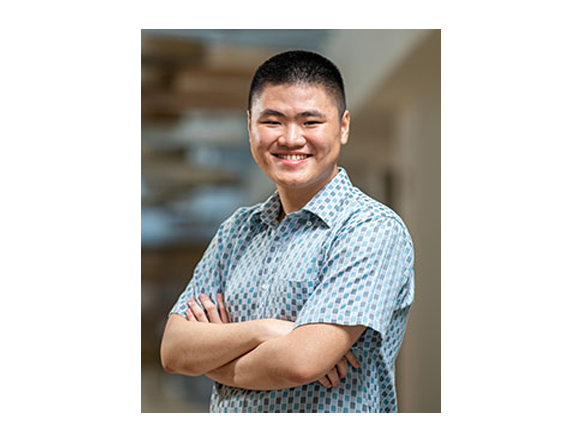
Lee Kuan Yew Award recipient | DCPE Gold Medallist | Class of 2019 Lee Kuan Yew Award recipient | DCPE Gold Medallist | Class of 2019 Singapore Polytechnic DCPE was my top choice as I knew that it will equip me with the relevant computer networking, cyber security skills and industrial certifications. I also had the opportunity to apply my skills and knowledge during my internship at the Center for Strategic Infocomm Technologies where I developed a unique solution to identify potential data leakage. This has given me the confidence to help support Singapore's growing need for computer scientists and engineers.

DCPE Gold Medallist | SingTel Engineering Cadet Scholar | Class of 2018 The DCPE course allowed me to explore various technologies, including machine learning and computer vision, while equipping me with valuable skills in computer networking and security. I also had opportunities to pursue renowned industry certifications and work on diverse industry projects, creating innovative solutions that redefine how we interact with technology. These experiences prepared me to solve real-world problems and tackle future challenges.

DCPE Merit Graduate | British Petroleum Scholar | Class of 2015 Singapore Polytechnic’s DCPE program provided a strong foundation with technical skills and soft skills like systems thinking and resilience. This prepared me for Cambridge University, where I earned the British Petroleum scholarship. SP’s supportive environment and curriculum helped me excel academically and gain a global perspective, enabling a seamless pivot to finance, where I applied engineering expertise to add value in investment banking and private equity.

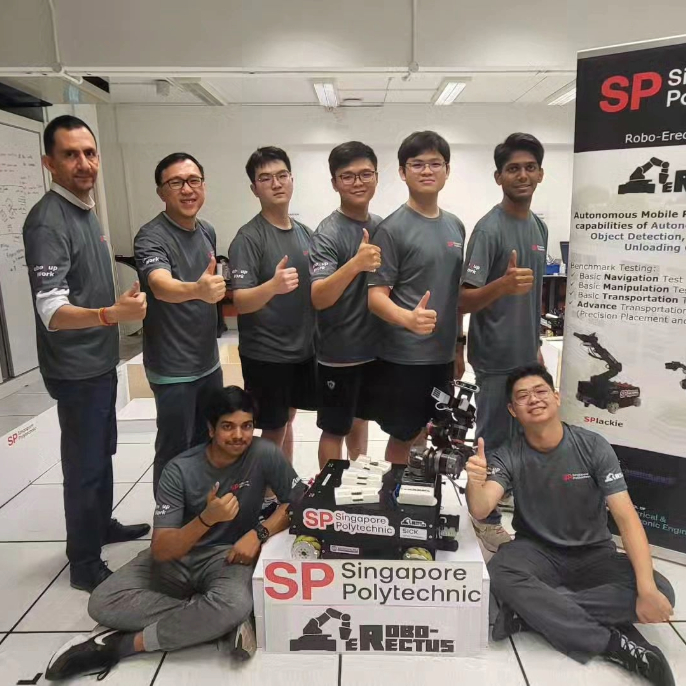

Singapore Polytechnic
500 Dover Rd Singapore 139651
Last updated: 04 February 2025
© 2024 Singapore PolytechnicBest viewed using latest version of Microsoft Edge, Mozilla Firefox, Safari and Google Chrome.
